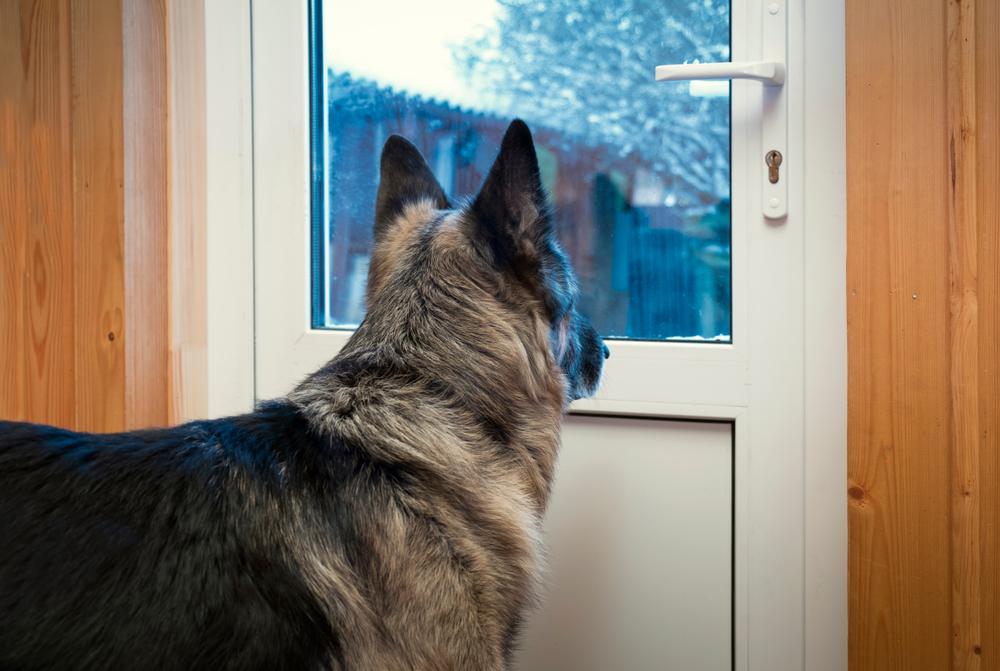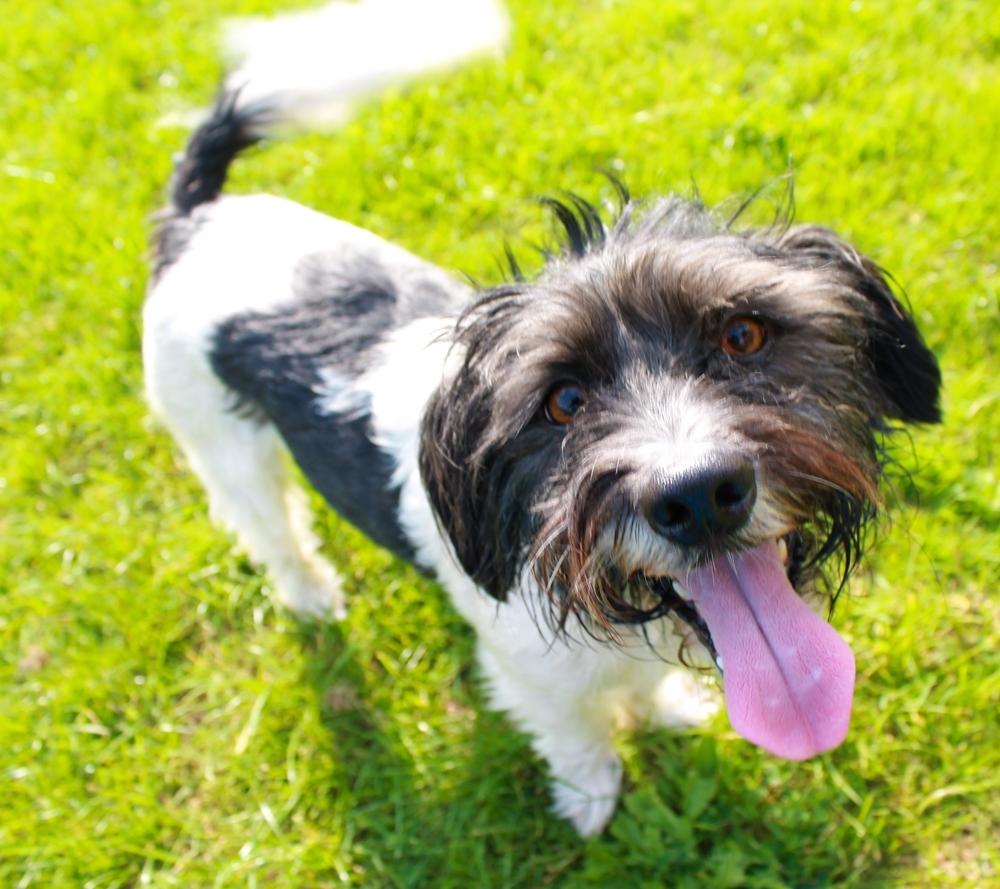

Dogs aren't strangers to upset stomachs. But from notoriously sneaking snacks out of the trash and the resulting bellyaches to being extra gassy at seemingly the most inopportune times, dog constipation tends to fall at the end of the list. Even if it demands less attention when swapping stories with fellow pet parents, constipation in dogs is an uncomfortable condition that warrants examination, attention and care.
What Is Dog Constipation?
Constipation is a condition in which a dog passes stool less often or in a smaller amount than usual. While this sounds simple enough, it's important to recognize that constipation isn't a total blockage of defecation. When constipation is severe enough that defecation is impossible or nearly impossible, it's referred to as obstipation. With constipation, the bowels are still moving along, just more slowly; with obstipation, things come to a near halt, which is more serious.

How To Tell if Your Dog Is Constipated
Signs of constipation or obstipation in dogs include:
Asking to go out more often despite producing little or no stools
Straining to defecate
Producing hard, dry stool
Defecating in unusual locations, such as house soiling
Producing small quantities of stool
Producing small amounts of liquid stools mixed with mucous or blood
Vomiting
Acting lethargic
While considered a normal stretch for dogs, repeatedly assuming or holding the "prayer position" — front limbs stretched out and lowered with hind limbs in the air — for an extended period can also indicate abdominal discomfort, particularly in combination with other signs of constipation.
What Causes Constipation?
A wide range of causes can lead to dog constipation, including:
Intestinal tract blockages
Lack of water intake
Conditions that compress the colon or rectum
Neuromuscular problems
Side effect of drugs or anesthesia
Tumors
Reluctance to eliminate on a regular basis can also contribute to constipation. This may occur due to environmental stress or conditions that affect mobility, such as arthritis in dogs or canine hip dysplasia. Sedentary habits or lack of exercise may also play a role in dog constipation.
What if Your Dog's Constipated After Diarrhea?
Since diarrhea empties the bowels, it can take time for your dog's gastrointestinal (GI) tract to resume as usual while normal, healthy stool forms. For this reason, it's possible your dog may not produce stool for a couple of days following a diarrhea episode. However, this isn't considered constipation — it's just your dog's digestion getting back on track. If your dog had diarrhea and it's been more than a couple days since they've produced stool, check in with your veterinarian.
Can Antibiotics Cause Constipation in Dogs?
Antibiotics can alter your dog's gut flora, which may lead to digestive upset such as gas, diarrhea and constipation. If your vet prescribes your dog antibiotics, talk to them about what to expect and when to reach out.
Are Probiotics and Prebiotics Helpful for Canine Gut Health?
The potential of dogprobiotics and prebiotics to support overall health and wellness has created buzz in the veterinary care and nutrition world — not to mention among pet parents. Simply put, probiotics are live microorganisms that help support gut health. Sometimes mistaken for a subcategory of probiotics, prebiotics are soluble fibers that nourish the unique ecosystem of microorganisms in your dog's digestive tract. In other words, they feed the beneficial bacteria that already exist in your dog's gut.
Probiotics can provide GI support during periods of stress or illness by boosting the populations of helpful bacteria. Prebiotics can help maintain your dog's gut health for long-term support. Talk to your vet about your options!
Treating Constipation
While it would be nice to have a one-and-done dog constipation remedy, treatment depends upon the severity, duration and underlying cause of constipation.
Some cases of constipation are transient and may resolve without medical intervention. Mild to moderate or recurrent cases typically require some level of treatment. Your vet may recommend various treatment modalities depending on your dog's situation, including:
Psyllium (soluble fiber)
Stool softeners
Laxatives
Motility modifiers
Subcutaneous or intravenous fluids to correct dehydration
Enemas
Surgical removal (in severe cases)

What to Give a Small Dog for Constipation: Special Considerations
Generally speaking, the same treatment methods apply to small dogs. However, small dogs and puppies are at greater risk for canine dehydration compared to large breed dogs. Constipation can also progress more rapidly in small dogs, so it's essential to seek veterinary care right away.
Tips for Preventing Dog Constipation
Anticipate Likely Causes
You can help prevent some cases of constipation by anticipating their arrival. If being boarded or taking oral antibiotics tends to trigger constipation, for example, your vet can help you find a preventive solution to address constipation before it sets in.
Work With Your Vet
Routine physical exams allow your vet to examine your dog's abdomen, assess their hydration status and evaluate any osteoarthritic conditions that may disrupt their normal bathroom habits. If you notice a change in your dog's potty patterns, address it with your vet promptly before it advances.
Provide Exercise, Water and Complete Nutrition
While you can't always avoid GI upset, you can take steps to support your dog's digestive health and overall well-being. Provide them with adequate exercise, constant access to fresh, clean water and a complete and balanced food that supports gut health. From there, lean on your vet for help — they're your trusted partner in helping your dog thrive.
Taking Preventive Measures at Home
Upset stomachs are normal now and then, but you can take steps to help prevent them. For one, if you have to change your puppy's food, always do so gradually over a week by mixing small amounts of the new food in with the old food. Consider providing your puppy with a complete and balanced food intended for their life stage and formulated to support gut health with prebiotic fiber — your veterinarian can help you narrow down your options.
Keep garbage cans sealed, lock away any potentially toxic items and avoid feeding your puppy table scraps. Puppies require a delicate balance of nutrients to thrive, and pizza crust isn't part of that equation.
Last but not least, take your puppy in for regular veterinarian visits, including vaccines and parasite prevention. This is an important part of keeping your puppy's gut health in excellent shape. If you have a puppy with an upset stomach that doesn't seem to be improving on its own, trust your gut and seek veterinary care. Part of showing your love is seeking the professional care your puppy deserves.

























